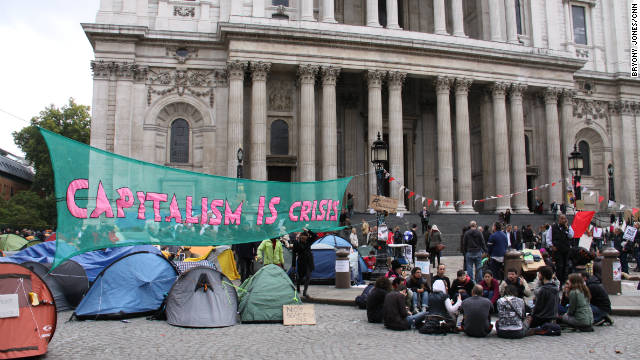In 2011 the “Occupy London” protest set up a camp close to St Paul’s Cathedral in the heart of the City of London. The camp affected access to a number of businesses in Paternoster Square, next to St Paul’s. One of the affected businesses was a Corney & Barrow wine bar. The ratepayer appealed against the rating assessment of the wine bar, seeking a temporary reduction during the period of the disturbance. Their appeal was heard by the Valuation Tribunal for England (VTE), which granted them a reduction of 22.5% in their rating assessment between October 2011, when the camp was first set up, and February 2012, when it was finally cleared by police and bailiffs.
The Valuation Officer appealed to the Upper Tribunal (Lands Chamber) against the decision of the Valuation Tribunal for England and the upper Tribunal has now issued its decision. The ratepayer did not respond to the Valuation Officer’s appeal, so the matter is known as The Appeal of Pavlou (VO) (2015) UKUT 0102 (LC).
The Valuation Officer contended, firstly, that the Occupy London protest was for too short a period to justify a reduction in the rating assessment of any of the properties affected by it. He considered that the protest was “inherently unsustainable” and would not have been expected to continue and should not therefore be taken into account in valuation for rating purposes.
The Valuation Officer’s second, and alternative, contention was that the reduction granted by the VTE was excessive. He contended that the VTE should not have had regard to the rental reduction granted by Corney & Barrow’s landlord or, that if regard should have been had to this evidence, it had not been correctly interpreted. The Valuation Officer asked the Upper Tribunal to reinstate the original assessment of the wine bar or, alternatively, to award a reduction of only 5%.
The Upper Tribunal dismissed the Valuation Officer’s contention that the protest was too transient to be taken into account, saying that the “nature and likely duration” of the protest was such that it would have affected hypothetical rental values in the locality. The Tribunal did however consider that the allowance granted by the VTE was excessive, being based on an incorrect analysis of the rent reduction, but did not agree with the Valuation Officer’s proposed analysis. The Tribunal determined a 9.5% reduction in the assessment for the period of the protest.
The Upper Tribunal’s decision shows that there can be no general rule as to what is, or is not, too “transient” to affect rateable value. It is important to bear in mind the severity of an event as well as its duration. A short period of disturbance may be taken into account if its impact is severe. The rent reduction needed to be viewed over the period for which the rental concession applied.

